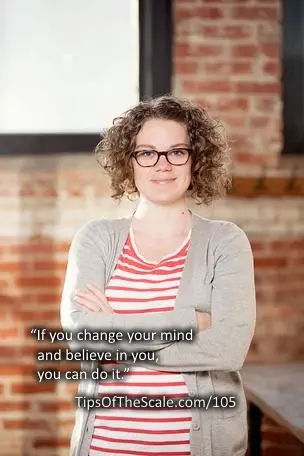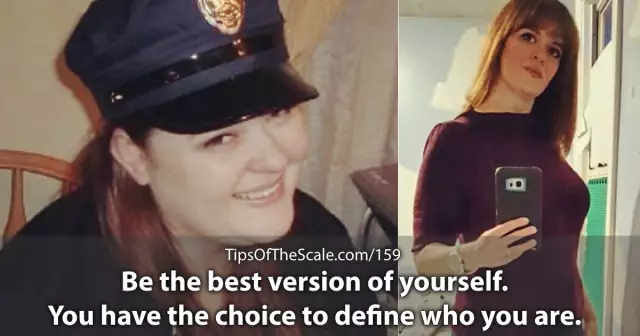Writing for the largest diet review site on the net, Brandi Koskie has gained a valuable and unique perspective on characteristics of successful weight loss efforts.
“Get busy living or get busy dying”
Background and Bio
Brandi is co-founder of www.dietsinreview.com, which has been called “The Wikipedia of Diets.” The site is an unbiased 3rd party catalog of weight loss methods.
Brandi has a getting-healthy story of her own. She noted that before her work at DietsInReview, she ate almost all processed food, didn’t exercise and was “skinny-fat.” Through working at www.dietsinreview.com, Brandi’s grocery list now leans towards whole foods, and she has also completed a half marathon.
Brandi shares how transformation stories are the most rewarding aspect of her work. Seeing the real work people have done—finding exercise or getting into a healthier relationship with food—is inspiring.
Recently Brandi got to meet Alan Ali (super-inspirational guy and upcoming TipsOfTheScale guest) at a conference, and was so excited to see him after following his journey online that she burst into tears. Brandi loves having a front row seat for so many of these transformation stories.
Inside the Health & Fitness Industry
After working the past 7-8 years in the health and fitness industry, there are moments when Brandi feels frustrated and even jaded, saying “I’ve peaked behind the curtain.” Frustration comes quickest when she feels like consumers are being taken advantage of by the industry—both financially and emotionally—by the promotion of endless “miracle” supplements, for example.
“If is looks too good to be true, it probably is.”
(See this article for our brief discussion about Dr Oz and his involvement in diet scams.)
The same goes for just about every new diet out there. Brandi hears pitches for hundreds of diet books each year, and with supplements and new diet books getting released constantly, it’s just a “new package, same story.”
“I don’t know that there’s another industry that exists that takes people the way this one does.”
Insights on Getting Healthy
Having researched hundreds of diets, Brandi shares her perspective on getting healthy in a world of “one size fits all” products. Every person’s body is different, and they need different approaches. Brandi stands by a common sense approach:
“You didn’t put it on overnight and you’re not going to lose it overnight.”
It is important to allow yourself to go through the process and the transformation. While we live in a quick-fix society, we need to be aware that usually the faster the weight comes off, the more likely it would come back on faster. “When it comes to our own bodies and our own selves we need to be more willing to let that process happen…and ‘30 days’ and ‘45 days’—you’re not going to change much, and if you do, it’s not going to last.”
Brandi has seen the statistics for people who lose weight slowly through a lifestyle change, and those people are more likely to keep off weight for the long term.
Brandi points to John Thompson who lost 200 pounds and is occasionally featured on www.dietsinreview.com, to explore the notion that weight loss can begin gradually. “It’s not an all-or-nothing kind of thing, and it’s not an all at once thing.”
Initially, John ordered brown rice instead of fries, and that was his first step in healthier choices. Slowly but surely, changes can become second nature and then the changes just become who you are. Brandi is fond of the quote from the Biggest Loser contestant Courtney Crozier, who said in her season finale:
“If you change your mind and believe in you, you can do it.”
One of Brandi’s pet peeves is “that you can’t cheat. I hate the word cheat.” Eating isn’t cheating; it is just a choice you make in that particular moment. If you were to plan ahead for a splurge, then you can account for it, and incorporate it into you life. If you keep your fridge stocked with healthy things, you can get yourself right back on track.
But, of course, you have to know yourself, too. What are you own triggers?
“If you are one of those people who has the first potato chip, and you’re not going to come up for air until you’re shaking the corner of the bag, then no, I can’t have potato chips.”
Know your limitations. The deprivation aspect of weight loss can put people off diets so quickly. When they review diets for their website, Brandi says they look at how restrictive a diet is. They feel like “no diet should cancel out an entire food group,” because that would be too restrictive, and that’s not how people live. If a diet you’re considering does this, walk the other way.
People are attracted to flexibility, personalization and customization. People want to be able to live a little. If you can’t go to a personal dietician, you can use the web to have a plan customized for you. Affordability and access to the program always help. There is not one solution for everyone, but the thing you can live with is what will earn you success. Going into a weigh loss plan, going in with a feeling of dread of the deprivation isn’t a good way to set up for success.
Practical Strategies
What strategy does Brandi use to plan for going into unexpected events and holidays?
If there’s a big dinner, she will probably eat lighter meals earlier in the day. Stay well hydrated! Volunteering to host an event is a good way to get some items on the table that you know are healthier than alternatives others might make.
Road trips also take lots of planning ahead. Plan meals so that you don’t need to stop and get fast food, but have fruit in the car as a snack instead. Pack a cooler and take it with you. Always avoid trying to feel “hangry” (hungry+angry). You can go all-in at a buffet, but eat lighter beforehand, and get back to normal eating the very next meal or day.
Sometimes the stress of life gets beyond what you think you can handle. Unexpected or tragic events can sidetrack your eating plan. Interestingly, major life events—the same things that might send you into a diet—can sometimes be the same things that will spiral you out of one. Eating you way through stress and starving your way through stress are both unhealthy. “Our lives are just consumed by food.” You have to change your mindset to figure out a way to break out of a bad eating cycle and get back on track.
On ‘The Biggest Loser’
Brandi shares her thoughts on the popular U.S. television show.
1-2 pounds of weight loss per week is generally regarded as safe in the industry. The Biggest Loser weigh-ins are “almost in a lab environment” and are not a fair depiction of reality or safe rates of weight loss. Contestants are given only the weight loss as their job—they are away from their families, kids, jobs, bills. They have professional chefs and trainers.
Most important to remember: The show’s producers have one goal – ratings.
Everything is highly produced for the show, just like makeover stories from the covers of magazines. However, there are positive takeaways from weight loss shows, such as hard work pays off. The show emphasizes changing what you eat, especially if you eat a lot of junk. The show also promotes workout buddies, covering the mental aspect of how contestants put on the weight. The follow up stories can be very powerful, as people figure out how to maintain their losses in their real life. Brandi can see both good as bad in the show.
Once again, “if it’s too good to be true, it probably is…take away the common sense parts, and leave the Hollywood stuff behind.” These types of shows have brought to light how pervasive the obesity problem is in the USA, and how we could maybe more easily empathize with someone who is obese. This show may be the only easy avenue to see information on some simple changes the contestants might make, but with the contestants’ losses folks can maybe also see the positive message that obesity is not a life sentence.
Traits of Successful Losers (Regardless of Diet)
Brandi shares some of her insights on what makes real-life dieters (not reality show personalities) successful:
- Commitment: Willing to give up a lot of things to get healthy, such as social engagements or even friends.
- Perspective: Not looking for the 30 day fix.
- Motivation: Losing weight should only be done for you—you are the only one who is as invested in you as you are. Doing it for you, versus someone else.
- Accountability: Set up good goals and leave yourself some flexibility. Goals that are broken down into benchmarks, by the month/week, etc. are more successful than a scale number that seems completely out of reach at the beginning.What is a healthier goal to have than the scale? Use bloodwork numbers from a physical as a baseline, or find a clothing item that is your benchmark. With goals, you have to allow some adjustment for plateaus and “life happens.”
Above all else:
Be happy. “Life, death, weight loss, food–don’t take it any more seriously than you have to.”
Resources Discussed In This Podcast
- www.dietsinreview.com
- www.calorieking.com
- Fooducate app
- www.twofoods.com
- “Tomato+nutrition” (for example) entered into Google
- foursquare – to find yoga studios, farmer’s markets, etc. near you
- CalorieCount Recipe Analyzer
On Brandi’s Workout Playlist
- Happy by Pharrell [ Amazon / iTunes ]
- Tom Petty [ tom petty / iTunes ]
- Michael Franti & Spearhead [ Amazon / iTunes ]
Contacting Brandi
- Website: DietsInReview.com
- Twitter: @brandik
- Facebook: Diets in Review on Facebook






You must be logged in to view comments.